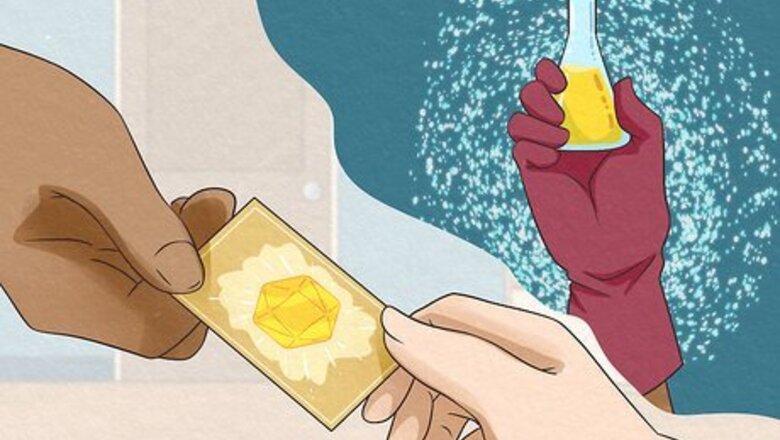
views
What is inspiration in D&D 5e?
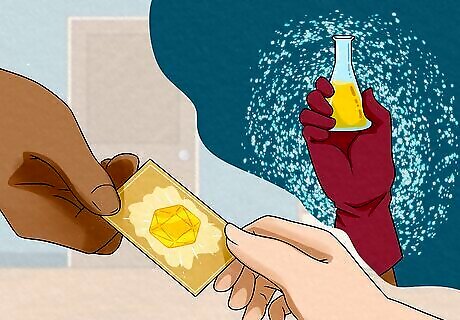
Inspiration is a mechanic that allows DMs to reward players at any point. It rewards players for being true to their characters’ personalities, ideals, bonds, and flaws (though, at the end of the day, it can be used however the DM sees fit). Inspiration encourages players to roleplay, be creative, and take risks at the table—particularly because it grants advantage on an ability check, saving throw, or attack roll. For example, you might get inspiration for acting according to your PC’s (player character’s) bond and recovering a stolen artifact from their home or upholding the vow they made to their family. Remember, the DM chooses when players get inspiration—so if you’re a player, you can’t pick and choose when you get it. Enjoy the game, and let the DM explain how they want to award inspiration.
Gaining Inspiration as a Player
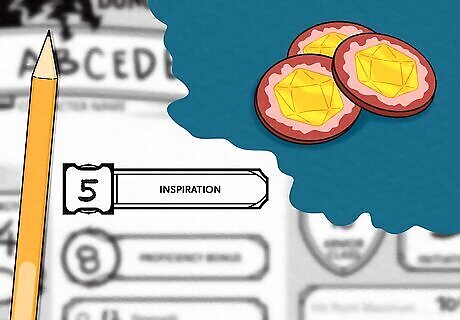
Track inspiration on your character sheet or using tokens. DMs can hand out inspiration for a wide variety of reasons—usually related to creative roleplaying choices or actions in the game. If your DM says your PC has earned a point of inspiration, the easiest way to track it is to make a note on your character sheet. Alternatively, the DM could hand out tokens (like poker chips) to signify inspiration. If you’re a DM, you might also consider handing out special d20s (in a different color than what your players have, for example) to represent inspiration. For players and DMs, remember: generally, players are only allowed one point of inspiration at a time.
Using Inspiration as a Player
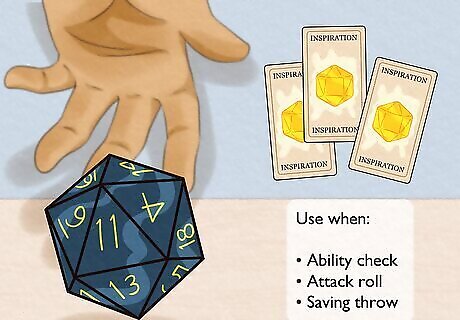
Use inspiration when making an attack roll, saving throw, or ability check. When a particular roll feels important, or you want a better chance of succeeding—whether it’s an ability check, attack roll, or saving throw—roll with advantage to apply your point of inspiration. Advantage simply means rolling 2d20s (20-sided die) and taking the higher result. For example, say you had a point of inspiration, and the DM asked you to make a Persuasion check to try and convince a powerful foe to stand down. If it felt relevant to your PC’s story (or you just really wanted to succeed), you could add your inspiration to the roll for advantage and thus be more likely to persuade the foe successfully.
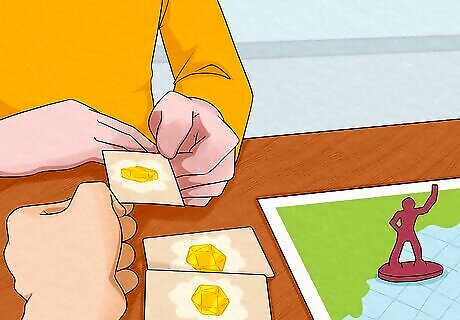
Give your inspiration to another player, alternatively. If you have inspiration, you can choose how to spend it, including giving it to other players at the table as a reward for doing something you think is worthy. You might inspire a fellow player for good roleplaying, making the gameplay more exciting, or coming up with a cool idea you’d like to see succeed. You’re certainly not obligated to give away your points of inspiration—but remember that D&D is a collaborative game. It can be just as fun to help others succeed as pulling off awesome feats yourself!
How to Award Inspiration as a DM

Award inspiration when players find inventive ways to enhance a game. Inspiration is a flexible, open-ended tool to help you spice up a D&D game; there are no rules on exactly when to use it because there’s no way to predict what’ll happen in a session. So, if you’re a DM, simply look for any player moments that make the game more fun and memorable—and reward them for rising to the occasion! Try handing out inspiration to each player (and PC) at the table roughly once per session of D&D. However, it’s okay to do it more or less often—whatever works for your DMing style and players. Inspiration can also encourage certain behaviors since your players might pick up on the things you reward them for and try to do them more often. So, think about what behaviors you want to see at the table. What might make the game more fun? What best fits with the campaign’s genre? This can guide your personal rubric for awarding inspiration.
What can you award inspiration for as a DM?

Roleplaying Roleplaying (acting as a character according to their traits, ideals, flaws, and bonds) is a crucial part of the D&D experience—but it’s also not always an easy one. So, when a player goes above and beyond, making a roleplaying choice that’s significant in some way, reward them. For example, you might award inspiration to players for: Progressing the story with a major roleplaying decision. Putting the entire party in danger (if the action is something their character would truly do). Doing something funny that makes the whole table laugh. Coming up with a clever way to solve a problem. Keep in mind that players roleplay differently. Some might love speaking in accents as their PCs, while others might be self-conscious and prefer to describe what their PCs do and say. Try not to favor one roleplaying style over another; as long as your players are participating and doing their best, that’s all that matters!
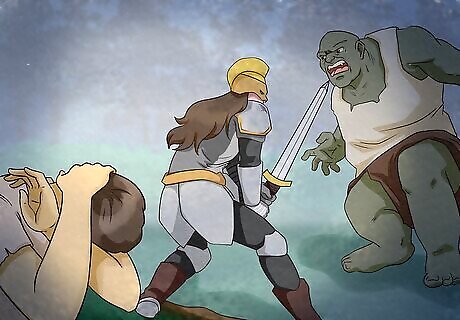
Acts of heroism or bravery Use inspiration to show your players that it’s okay to take risks and do things that might get their PCs hurt or put them in danger. If you want your campaign to feature lots of action, dramatic fights, and feats of bravery, try awarding inspiration when a PC does something heroic at great personal risk. For example, you might award inspiration to a PC that throws themselves between an innocent NPC and a dangerous spell or leaps off a roof to land in front of a group of bandits. That way, players can see there’s a clear reward for using risky tactics—and they might start doing it more!
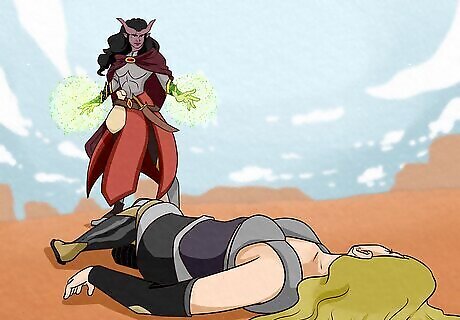
Achieving victory or striking the final blow Inspiration typically comes down to a judgment call from DMs. However, if you prefer not to judge your players’ actions, you could instead award inspiration for concrete achievements—namely, defeating an enemy in battle or achieving a significant victory in the story. For example, you could award inspiration when the party: Defeats or strikes the final blow against a powerful enemy in battle. Finds another way to thwart an enemy without direct violence. Completes a major quest or fulfills an important goal they’ve been working toward.
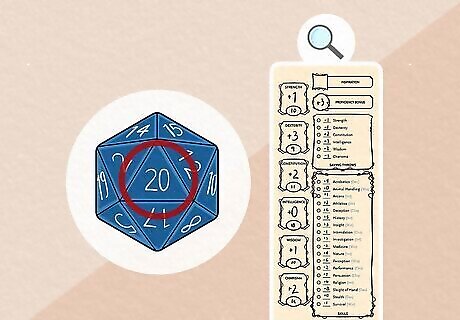
Rolling crits on skill checks On attack rolls, rolling a natural 20 is called a “crit.” The attack is an automatic success; PCs deal extra damage and can have some truly memorable combat moments. However, skill checks and saving throws technically can’t crit—which can make a natural 20 disappointing. So, consider awarding inspiration for crits on skill checks as a way to reward the natural 20! Keep in mind that players might try rolling as many skill checks as possible trying to crit with this rule. As the DM, do your best to regulate skill checks (or the number of times per session players can get inspiration this way). For example, you might rule that players can’t reroll the same skill check multiple times if they fail, or that players can only get inspiration this way once or twice per session.
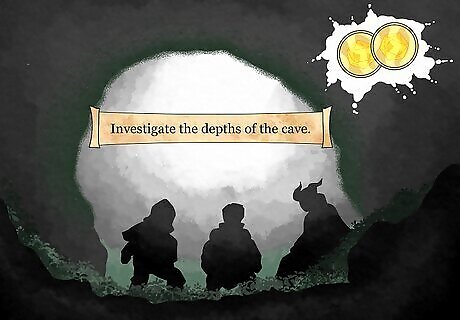
Reinforcing genre conventions Consider what overall “genre” your D&D campaign is designed to reflect. Is it a horror-themed campaign? Does it feature political intrigue? Is it centered around a roguish heist? Whatever the genre, try awarding inspiration when players do things that play to the genre and enhance the overall gameplay as a result. For example: Say you’re running a horror one-shot, and a player suggests investigating a clearly haunted mansion (even though it might not be wise). If the party agrees, consider giving them all a point of inspiration.

Helpful acts outside of the game Actions in-game aren’t the only things that deserve inspiration. Since inspiration is a reward for making the game more enjoyable, consider giving players inspiration when they do that outside the game, too, fulfilling a “job” or responsibility that helps their fellow players (and you, the DM). For example, players might get inspiration for: Managing the party inventory. Players keep track of their party’s inventory so they know what they have and which PC each item belongs to. A player who takes on inventory-tracking duties can make the game easier for everyone! Taking notes. While players are generally encouraged to take notes during each session, it doesn’t come naturally to everyone—so reward a player who diligently takes notes and shares them with the group. Writing a session recap. Sometimes it’s hard to remember what happened in a previous session, especially when sessions are weeks (or months) apart. If a player writes their group a recap of the previous session, reward them! Bringing snacks. D&D sessions can be long—so a player who brings snacks to a session definitely deserves a little inspiration as a show of appreciation. Keep in mind that the ideas in this section aren’t the only things you can reward a player for in D&D—just some of the most common ones! It’s your call; you can award inspiration for any action you think is worthy.
When to Award Inspiration
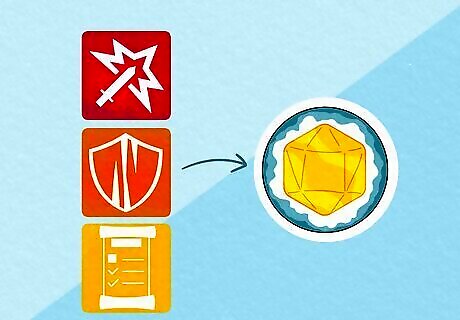
You can choose to wait until after an action to give inspiration. The most common way to award inspiration as a DM is by waiting for a player to do something you feel is worth the award and then telling the player they’re getting inspiration. This can help keep gameplay flowing without interruption and lets players come up with their own ideas without knowing when (or if) they’ll get inspiration. If you prefer giving your players as much freedom and immersion as possible, this might be the method you use to give inspiration. The downside to this method is that players can’t spend their point of inspiration on the action that earns it in the first place unless you (as a DM) allow a retroactive roll with advantage.
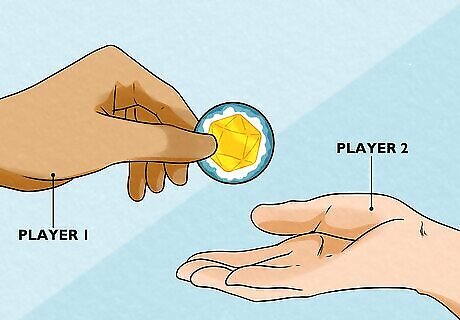
Alternatively, you can offer inspiration as an incentive before an action. Some DMs choose to encourage particular actions during gameplay by telling their players that attempting something will earn a point of inspiration. This can give players a little extra clarity and help guide their choices when they’re not sure of something. The main downside of this method is that it can feel like you (as a DM) are restricting or manipulating your players into making certain choices. However, this method can be preferable for D&D groups that feel cohesive, group storytelling is more important than individual character freedom.

Some DMs opt to ignore the inspiration rule entirely. The rules of D&D are always (and have always been) up for interpretation. If you don’t want to include inspiration in gameplay, that’s your choice! Some DMs feel inspiration encourages metagaming (using external knowledge to determine a character’s actions), while others just don’t feel that PC actions need extra incentives. Ignoring inspiration might work best in campaigns where you (as a DM) want to be more impartial, letting dice rolls determine the course of the story—for good or ill.
Inspiration Variant
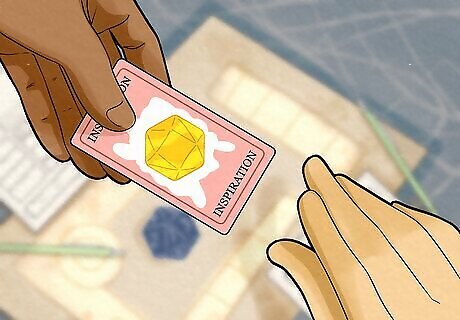
DMs can alternatively let players award one another inspiration. It’s already stated in the rules that one player can give another their inspiration, and this variant rule simply takes that idea a step further. Instead of the DM deciding who gets inspiration, the players are responsible for recognizing when one of them does something noteworthy and awarding inspiration as a result. However, it’s important for DMs to ensure that inspiration is rewarded fairly. Try sitting down as a group and agreeing on guidelines for awarding inspiration that apply to all players. With this rule, there are no limits to the amount of inspiration that can be gained, and unused inspiration carries access sessions. Players can also award inspiration multiple times per session—but there’s a catch! The first time a player awards inspiration, it’s free. Every time afterward, the DM gains a point of inspiration to give advantage to one of the player’s foes in the game.

















Comments
0 comment